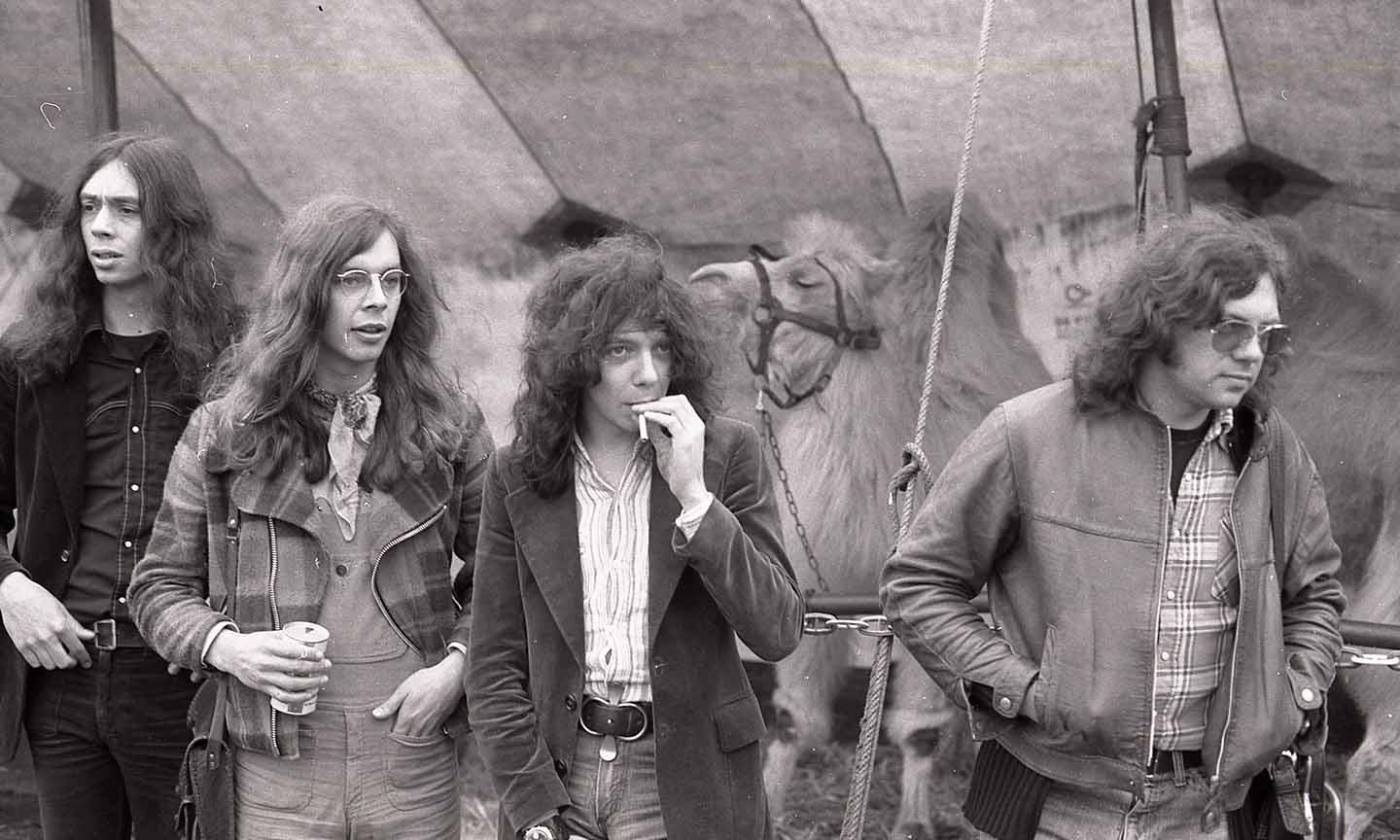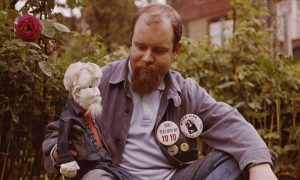Camel didn’t wear flowing, sequined capes, dress up like giant flowers, plunge daggers into their keyboards, or indulge in any of the other outrageous attention-getting antics employed by their 70s British prog brethren. Instead, they did something equally radical in its own way: They just stood there and played their butts off.
It may have been their distaste for flash and flamboyance that kept them at cult hero status. It certainly wasn’t their music, which could move from gorgeously symphonic, jaw-droppingly challenging, alarmingly infectious, or endearingly odd, as the moment demanded. From the start of their initial run with their self-titled 1973 debut to the end with 1984’s Stationary Traveler, they shifted styles and personnel multiple times, but singer/guitarist/flautist Andy Latimer was the force that maintained that quintessential Camel quality all the way through.
Order the extensive Camel best of collection Air Born – The MCA & Decca Years 1973 – 1984 now.
Here are 20 classic Camel cuts from across their discography, representing the many musical faces of the great, rocking humpbacked beast.
The Rockers
(Arubaluba, Freefall, Manic, Another Night)
Don’t be misled: Pete Bardens’ fuzzed-out organ and bubbling-lava synth tones and Andy Latimer’s four-alarm guitar riffs evoke images closer to a blazing inferno than the mellow, island vacation vibe that the title “Arubaluba” might imply. Camel’s first album is the rawest, most rocking in their catalog, and this hard-charging instrumental is easily one of the band’s most barnstorming tracks.
Fans consider the band’s second album, Mirage, the beginning of the classic Camel period. The opening track, “Freefall,” makes the reasons immediately obvious. Musos will moon over the head-spinning compound meters, but all you need is a pair of ears (or even just one, for that matter) to be bowled over by the shift between Bardens and Latimer’s churn-and-burn rock riffage and the sneakily sophisticated jazz fusion feel that bassist Doug Ferguson and drummer Andy Ward slide underneath all the carnage.
On 1976’s Moonmadness, Latimer and Bardens decided they’d write one song for each band member, inspired by their personalities. For Ferguson, they came up with “Another Night,” a stomp-and-crunch ode to nocturnal delight. “He was always disappearing at night and walking the streets, doing silly things,” Latimer told Prog’s Dom Lawson in 2019, “so we came up with ‘Another Night.’” It’s as close as the idiosyncratic Camel’s came to a no-frills stomper. “It’s meant to be solid, simple rock’n’roll,” confirmed Latimer. “It didn’t come out like that, but that was the intention.”
Though Latimer was the last remaining original member by 1982, The Single Factor still had some fire under its hood. Both the lyrics and the furious feel of “Manic” offer a tumultuous trip into a frantic, fraying mind. Latimer’s old cohorts may be gone, but he’s surrounded by a prog dream team including Genesis co-founder Anthony Phillips, Curved Air keyboardist Francis Monkman, Alan Parsons Project bassist David Paton, and Sky percussionist Tristan Fry.
The Beauties
(Rhyader, Song Within a Song, Air Born, Tell Me, Elke)
Camel’s gorgeous melodies and graceful arrangements made them one of the most influential first-gen prog bands. The lush beauty of their all-instrumental 1975 concept album The Snow Goose inspired generations of prog bands to come. On “Rhyader,” Latimer’s flute skills come to the fore, gliding over Bardens’ delicate, dreamy piano lines to tell the story of the lonely artist at the center of the Paul Gallico novel that inspired the album.
Camel made a conscious decision not to follow The Snow Goose with more of the same, so they made Moonmadness a vocal-oriented album. But while the first half of “Song Within a Song” runs on a sweet Bardens/Latimer vocal harmony not a million miles from Pink Floyd, the lazy, hazy flow of Latimer’s lambent strumming and pastoral flute and Barden’s pointillist electric piano give the previous album a run for its money in the dreamy department.
“Air Born” is the Moonmadness character study meant to evoke Latimer’s personality. The acoustic, neo-classical intro, creamy keyboard orchestrations, and Latimer’s laconic vocals capture the guitarist’s quintessentially British low-key leanings. “I was imagining woods and fields and all that stuff,” said Latimer, “just trying to capture more of an English feel.” Apparently, there were other contributing factors to the track’s mellow vibe. “Andy was smoking a joint,” said Latimer, “and in the middle section you can hear all this inhaling going on.”
The band’s first big personnel shift came when former Caravan bassist/vocalist Richard Sinclair took Ferguson’s spot and ex-King Crimson saxman Mel Collins came aboard on 1977’s Rain Dances. It’s actually Latimer playing the buttery fretless bass lines on “Tell Me,” but Sinclair’s warm, wistful singing marks a major addition to the Camel arsenal.
Brian Eno had yet to unleash his groundbreaking Ambient album series when he contributed keyboards to Rain Dances’ most impressionistic track, “Elke,” but the poignantly placid instrumental isn’t terribly far from ambient territory. Eno’s keys, Latimer’s flute, and guest Fiona Hibbert’s harp melt into each other on the ideal soundtrack for floating down a river made of plush pillows.
The Prog Bangers
(Lady Fantasy, Rhyader Goes to Town, Chord Change, Lunar Sea, Skylines)
The 12-minute “Lady Fantasy” suite from Mirage is one of the most beloved Camel pieces, probably because the band throws damn near everything they’ve got into it. There’s an ultra-dramatic opening with a synth ostinato over power chords before shifting into a lyrical guitar line that prefigures The Snow Goose. Bardens slips some Soft Machine-esque organ lines in, Latimer does some shredding over Ferguson and Ward’s galloping beat, Bardens digs into some funky clavinet and whirling Minimoog. By the time it’s over, you’ve absorbed more ideas than some bands bring to their entire discography.
Camel moves through multiple modes on “Rhyader Goes to Town” as well, with Latimer throwing down harmonized guitar lines over a brisk beat, Bardens busting out a whole crayon box’s worth of Moog colors, and the band tucking into a syncopated jam with a whiff of Pink Floyd while Latimer reveals why he’s hailed as one of prog’s premier six-string stylists.
Returning to the Moonmadness character sketches, “Chord Change” is for Bardens, an homage to his musical and personal complexity. “I always found Pete could be very changeable,” said Latimer, “so I thought we needed a piece with a lot of changes in it… with the complexities in Pete’s writing coming through.” Accordingly, the track bears some of Camel’s knottiest structures, but amid the acrobatic leaps, Latimer still finds time for the pretty melodic turns that were quickly becoming his signature.
The album’s closing epic, “Lunar Sea,” was a salute to Ward. “Andy was into a lot of things,” recalled Latimer, “especially jazz. So, when we started writing stuff, we knew that his song was going to be fairly jazzy and fairly complicated. Not jazz in the proper sense, because none of us were proper jazzers, but it was what we considered jazz, I suppose!” Camel was fresh off a stint opening for Soft Machine, and the influence of that band helped push the tune towards blurring the lines between prog and fusion, with all members at the edge of their considerable abilities.
There’s a fair bit of fusion happening on Rain Dances’ closing cut, “Skyline,” too. There’s even a three-piece horn section adding some subtle coloring. Over a counterintuitive time signature, Bardens shakes the rafters with his Minimoog, inspiring Latimer to show that he hadn’t gotten all the shredding out of his system on Moonmadness.
The Pop Tunes
(Your Love Is Stranger Than Mine, Wait, Remote Romance, Today’s Goodbye)
The band took a big turn toward pop on 1979’s I Can See Your House from Here, instituting some big lineup changes at the same time. Sinclair was replaced by the appropriately named Colin Bass, late of Steve Hillage’s band, while ex-Happy the Man man Kit Watkins and another former Caravan member, Jan Schelhaas, took over from the departing Bardens. (Yes, it took two players!) With its insanely earwormy hooks and lush harmonies, the single “Your Love Is Stranger Than Mine” should have made Camel Top of the Pops fodder.
Inexplicably, that didn’t happen, but it wasn’t for lack of pop potential. “Wait” adds a little rock muscle to the menu, along with a pulsing pace, another insanely catchy chorus, and some gut-busting synth solos. It’s easy to imagine an alternate universe where it found a friendly home on American radio alongside the likes of 10cc and Supertramp.
“Remote Romance” shows that Camel hadn’t been oblivious to recent rock developments, bringing a bit of New Wave/synth pop to the Camel table for the first time. It’s sequencers and vocoders a-go-go, as the prog pioneers come off more like Kraftwerk than King Crimson, with some technophile lyrics thrown in for good measure. What could have been a disaster in lesser hands ends up eminently endearing.
Speaking of 10cc, the ethereal harmonies and heartbeat rhythm of “Today’s Goodbye” from The Single Factor bear an eerie echo of that outfit’s “I’m Not in Love.” The album leaned even further into pop territory than I Can See Your House from Here. Listening today, it’s tempting to once again imagine that aforementioned alternate realm where adoring throngs sway with arms aloft while Camel fills a late 70s stadium.
The Quirky Cuts
(Down on the Farm, Metrognome)
Camel always had their offbeat side – it was pretty much a prerequisite for a British prog band of their vintage. And that aspect was amplified in the late 70s when Richard Sinclair entered the lineup. Sinclair wrote and sang “Down on the Farm” from 1978’s Breathless. At first it fakes you out, with an intro that leads you to expect a big, flashy rocker. But the track quickly shifts gears, sounding more like something from Sinclair’s former band, Caravan, with all the Canterbury quirkiness that implies. Sinclair’s agreeably plummy vocal style makes you feel like you’re beginning a P.G. Wodehouse audiobook. His ode to farm life is curiously urbane-sounding, but comes complete with animal noises.
Sinclair is also up front for Rain Dances’ “Metrognome.” Though it was written by Bardens and Latimer, Sinclair’s amiably arch singing lends just the right touch of Monty Python to the vocal sections, while the alternating prog bits pop up to remind us that even at their most eccentric, Camel could always play like nobody’s business.
Order the extensive Camel best of collection Air Born – The MCA & Decca Years 1973 – 1984 now.




